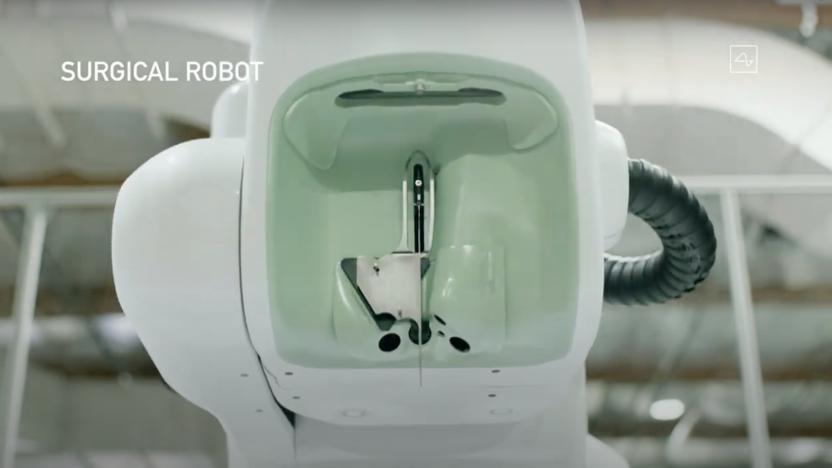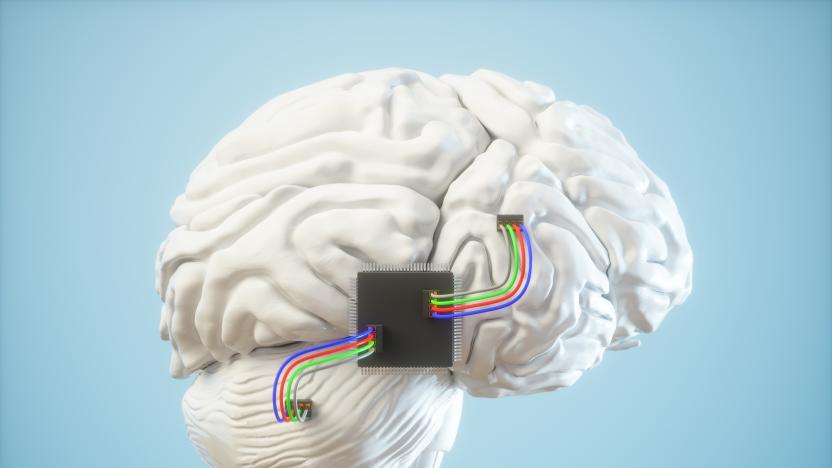BMI
Latest

Elon Musk unveils V2 of the Neuralink brain-machine interface surgery bot
Just over a year since their last major announcement, Elon Musk’s Neuralink is finally ready to show off the fruits of its labor: a revolutionary brain-machine interface that could blur the lines between humanity and technology, as well as give our feeble fleshy minds a leg up against increasingly capable AIs. "It’s important that Neuralink solves this problem sooner rather than later, because the point at which we have digital superintelligence, that’s when we pass the singularity and things become just very uncertain," Musk told Inverse in 2019. Musk took to the stage at the Neuralink headquarters on Friday afternoon to reveal a working “V2” prototype of the automated surgical system that the company debuted last year.

Watch Elon Musk's Neuralink reveal live at 6PM ET
Neuralink will apparently show off a working version of its brain-machine interface technology today.

Elon Musk expects to have a brain-machine interface in four years
A couple of weeks ago, the Wall Street Journal revealed Elon Musk's latest venture, Neuralink, and its plan for developing brain-machine interface technology. Now, Musk has invited Tim Urban of Wait But Why to write up an in-depth report of the company and what it's working on. Neuralink is hardly the only company working on things that will plug into our brains, and earlier this week we got a peek at what Facebook is working on in the area. One new thing we know from this report, however, is that Musk and his team seem pretty close to making it happen -- the SpaceX and Tesla founder figures they can have something on the market to treat severe brain injuries "in about four years."

Recording industry writes Trump on the eve of tech CEO visit
According to multiple reports, on Wednesday a number of high-profile tech execs will visit President-elect Donald Trump. The list includes Larry Page and Eric Schmidt, Tim Cook, Sheryl Sandberg, Jeff Bezos, Brian Krzanich and a number of others. Before that meeting goes down, however, the "music community" consisting of the Recording Industry Association of America (RIAA) and friends decided this was the time to speak up. In a letter (PDF) to Trump, the industry made its case for how valuable music is, and how that value (for their member companies) is being siphoned away by tech companies that don't do enough to make sure every note is paid for.

Researchers train monkeys to mind-control a wheelchair
A team of scientists at Duke University have developed a wheelchair that is controlled exclusively by the thoughts of its user -- in this case, one of two lab monkeys -- and have published their findings in the journal Scientific Reports. The prototype system relies on an implanted Brain-Machine Interface (BMI), rather than the scalp-mounted EEG that similar devices use. The BMI, though more invasive, does allow for a higher degree of command with less lag. "We wanted to have something that is closer to the way we move for a human who is completely paralyzed," study leader Dr. Miguel Nicolelis told Business Insider, "because you can control each movement continuously."

DARPA wants to build wetware so we can mind control computers
Hot damn, our Ghost in the Shell future is getting closer by the day. DARPA announced on Tuesday that it is interested in developing wetware -- implantable brain-machine interfaces (BMI) that will allow their users to control computers with their thoughts. The device, developed as part of the Neural Engineering System Design (NESD) program, would essentially translate the chemical signals in our neurons into digital code. What's more, DARPA expects this interface to be no larger than two nickels stacked atop one another.

Pandora ends its war with two major music publishers
If there's one thing that Pandora likes, it's a fight, but even the firm that bought an FM radio station to stick it to the man has limits. The outfit has decided to make peace with two of its most formidable adversaries: music licensing agencies ASCAP and BMI. Pandora has revealed that it's signed a new, multi-year deal with both entities that'll see it pay what'll probably be a higher fee every time one of their songs is played. Naturally, the terms of the agreements are being kept secret, but USA Today thinks that it'll be above the 2.5 / 1.75 percent that BMI and ASCAP, respectively, currently earn.

Judge rules Pandora has to increase royalty payouts to BMI
Pandora's propensity for litigation is pretty storied by this point, but it seems like the internet-radio outfit's luck has run out. A New York judge has ruled that Pandora must raise its payout rates to Taylor Swift's music publishing house BMI, from 1.75 percent of its revenue to 2.5 percent, according to The New York Times. The full ruling is still being kept under wraps at the moment, but naturally, Pandora says it's going to appeal the decision. Given that an appeals judge recently ruled in the outfit's favor to keep royalty payout rates from rising, it isn't clear what could happen in this instance. For artists' sakes, let's hope that history doesn't repeat itself here. [Image credit: Getty Images for TS]

'Thinking cap' controls prosthetic arm with thoughts, not surgery
The ability to control prosthetics with only the power of your mind has been around for a while, but it typically requires control electronics implanted directly into the patient. With this new, non-invasive method developed at the University of Houston, however, amputees can command their robotic limbs without surgery. Instead of implants, the UH system uses a wearable "thinking cap" (aka an EEG) that monitors brain activity externally through the scalp. A brain-machine interface (BMI) then interprets these brain waves and converts that intention into mechanical motion. Basically, the patient thinks about picking up an object, the BMI recognizes the intention and then tells an attached prosthetic to do so. Even at this early stage of development, University of Houston researchers have gotten the system to work properly 80 percent of the time.

Serious about getting in shape? Get Custom Fit
This free universal app is not intended for those of us who work out occasionally but are not really all that serious about getting in top shape. Custom Fit and Custom Fit Pro, a US$1.99 upgrade are aimed at the people who are dedicated to working out regularly and targeting specific muscle groups or parts of their bodies. Both apps require iOS 6.1 or later. Custom Fit allows you to choose your workout goals and duration of the workout. Then you target the body parts you want to train and improve. Custom Fit is limited to two goals, two workout lengths, and the opportunity to work on just two body parts at a time. To get more choices in all of these areas you need to purchase the upgrade to Custom Fit Pro. I set up a workout program first choosing between losing fat or building muscle. I decided on improving my muscle tone and then picked from 20 or 30 minute workouts, and finally decided to work on just one body part, my biceps. Custom Fit laid out five specific workout stages, first doing 5 minutes of moderate intensity on the treadmill followed by four different weight exercises with recommended reps and numbers of sets for each. No weight recommendations are given since the app doesn't know if you are working with free weights or other machines. Each exercise comes with a detailed animation showing how you are to do the exercise. Custom Fit offers the usual social media connections if you want to share your workout regime and progress with friends. You also can track your progress in the app with sections devoted to specific areas such as height, weight, arm and leg measurements in the Progress Tracker, your Diet Log allows you to list what you ate and when, and in your Exercise Log you can list the specifics of each of your workouts and track the number of sets you do with how many reps, rest between, and how long your workout lasted. If you purchase the upgrade to Custom Fit Pro, you also get a BMI tracker. BMI stands for Body Mass Index and is a measurement of body fat based on height, weight, and age. The paid version of the app also allows you to access more than 2400 individual workouts. If you are really committed to getting your body in top shape, Custom Fit would be a good app to use to start you on that path and once you make noticeable progress you can upgrade to the paid version.

Music licensing group BMI sues Pandora, deems radio station purchase a 'stunt'
Music licensors didn't waste any time in characterizing Pandora's acquisition of an FM radio station as an underhanded attempt to cheat performers out of royalties, but the rhetoric has now hit the courtroom, as Broadcast Music Inc. has filed a lawsuit against the streaming service in the New York federal system. Key to the action -- which casts Pandora's move as "an open and brazen effort to artificially drive down its license fees" -- BMI asks for a blanket determination of licensing rates for all music broadcast by Pandora. According to BMI logic, the lower royalty rates that terrestrial providers enjoy shouldn't apply to the online segment of Pandora's business. As the flip side to that argument, however, Pandora argues that it deserves equal footing with online competitors such as Clear Channel's iHeartRadio service, which pays the terrestrial rates. It's a murky decision, for sure. Hopefully the judge has a good supply of Advil.

Rat controls vehicle with its brain, Pinky and The Brain apply for 'one last run'
So, let's paint the picture, shall we? There's a rat, a bundle of electrodes, more wiring than an electrician would know what to do with and some sort of wheeled apparatus. In the background stands a team of crazed Japanese scientists, intent on never sleeping again until said rat controls said vehicle entirely with his mind. Nah, it's not a re-run of a WB classic -- it's real life, and it's happening now in a dark, shadowy corner at the University of Tokyo. The RatCar is a newly developed rat-vehicle experiment that researchers hope will open new doors for those with mobility issues; we've seen brain-machine interfaces change the lives of the disabled before, but giving them the ability to control their wheelchair with their mind (for instance) would be taking things to an entirely new level. As of now, the team still has to figure out how to accurately determine how much movement is coming from the rat's feet and how much is coming from its mind, but there's no question that the research shows promise -- just don't let the humanoids learn of our findings, okay folks?

Extended iTunes song previews delayed, licensing may be to blame
One of the things that was widely rumored to appear but ultimately absent from Apple's music event last week was an extension of song previews on the iTunes Store from their current 30 seconds to 60 or even 90 seconds. According to CNET, we can blame the Byzantine licensing arrangement of the music industry (surprise, surprise). Apple had a deal worked out with Broadcast Music, Inc. (BMI), all four major record companies, and a contract with American Society of Composers, Authors and Publishers (ASCAP) that never limited preview lengths in the first place. Apparently that still wasn't enough to increase preview lengths, because CNET says the National Music Publishers Association objected and basically said, "No, you have to make a deal with us, too." All of which just makes me wonder: how many different licensing associations does this cash cow industry need, anyway? The music industry giants gave up a lot of their power (and money) to Apple in the mid-2000s, and it seems they've learned their lesson. Unfortunately for us users, this obstructionism means we end up losing out on neat features. As CNET notes, the current mini-battle over song previews is likely just a warmup for the headliner bout: Apple's predicted music streaming service. Music industry execs already tried to get Apple to pay "performance fees" for its 30-second song samples; I can imagine Steve Jobs's response to that one was something like maniacal laughter followed by a hearty "No." If Apple does finally manage to get 90-second previews pushed through, it could be a good sign for its music streaming aspirations. [Via MacRumors]

Honda's ASIMO could be thought controlled in Spaceballs 2
Sorry, that's not actually Dark Helmet, it's a researcher demonstrating the latest Brain Machine Interface (BMI) cooked up for robotics. While it's not looking too portable, it's a far nimbler setup than the original MRI Scanner first concocted by Honda to control robots in near real-time back in 2006. This time, Honda Research Institute in coordination with Advanced Telecommunications Research (ATR) and Shimadzu Corporation have achieved robotic thought control using a sensor cap to measure electrical potential on the scalp and cerebral blood flow. While we've seen much of this BMI tech applied to video games in the past, Honda claims its technology achieves the world's highest accuracy at 90% without special training. Impressive, even though it's clearly R&D work for now. Check the video after the break. [Via Akihabara News]

bmi launches in-flight communications trial, voice gratefully excluded
We all know how the British hate lagging behind the French, so it's no shock to see bmi following Air France in the in-flight communications game. The airline has just announced that it will soon launch a six month trial of the OnAir service, though not surprisingly, voice calls will not be a part of said run. Instead, users in a single A320 making loops from London to Moscow will be able to send text messages whilst airborne, and in case that's too boring, users with GSM data cards will also be able to hop online. There's no mention of a VoIP ban, but given the clear anti-voice stance, we doubt the kind attendants would let you chatter long before giving you the evil eye.

Obesity experts frown on Wii Fit's fatty-labeling, Nintendo apologizes
Video games can occasionally be the source of some pretty disheartening self-realizations -- like the time Rock Band revealed that you've been lied to your entire life about your angelic singing voice, or when Vampire Rain made you realize that you have incredibly poor taste in video games. However, something tells us these revelations are a bit less heartbreaking than those about to be unleashed by Nintendo's latest best-seller, Wii Fit -- especially when the heart in question is the fragile, butter-soaked heart of an overweight child.Or an average-weighted child, for that matter. You see, Wii Fit measures the user's Body Mass Index (BMI), a weight/height ratio commonly calculated by physicians, though the use of BMI measurements in children is criticized by many dietitians for its frequent inaccuracy. Nintendo recently issued an apology following an incident involving the hurtful labeling of a "solidly built" 10-year-old girl. So, it's like an electronic, $90 version of our fifth-grade gym teacher? We're sold!

Wii Fit has a broad definition of fat
Don't take Wii Fit's weight assessments to heart.According to an angry poster at DISBoards, the game recently labeled a ten year old child in the UK as overweight, even though she's 4'9" and weights only six stones (84 pounds). Ouch. We're no doctors, but from what we can tell by browsing around the 'net, that's actually underweight. Assuming the poster isn't lying and that all the information was entered in correctly, we're surprised that Wii Fit would make such a mistake. We know that BMI calculations aren't always accurate in classifying someone's health, but that just seems ridiculous.The relative of the girl said that the child was pretty devastated by Wii Fit's assessment, and her family had a hard time convincing her that she wasn't fat.While we don't appreciate Wii Fit's attempt to make people look like mini-Skeletors, the message is clear: take this game with a grain of salt. Wii Fit isn't a doctor or nutritionist -- it's just a game. So don't let it launch you into a hunger strike, or turn you into an anorexic. %Gallery-4745%[Via CVG]

It's official: iTunes tracks will remain $0.99 each
After months of debate (could you imagine being involved in "months of debate" with Steve? No, thanks), Apple and the Big Four record companies have come to a deal that will allow the iTunes Music Store to avoid variable pricing, keeping the cost of a single track to $0.99 (more or less). I'm really glad that Apple's pricing structure came out on top in this. By pricing some tracks below some others, the record companies identify those particular tunes as less "valuable," and therefore less desirable, than others. Keeping the pricing the same across the board allows me to decide which is a "good" track and which isn't my cup of tea.[Via MacDailyNews]









